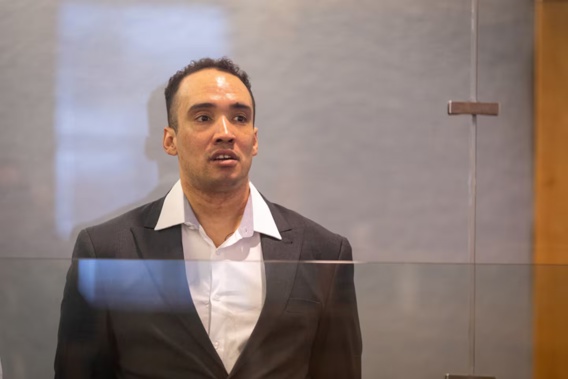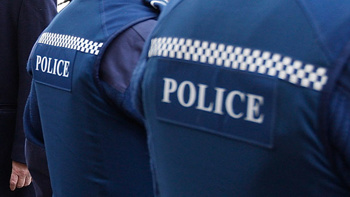
A man accused of murdering a pensioner by stabbing him in the neck in his Auckland apartment has been found guilty of murder.
Sergio Frederico Williams, 36, argued the killing of Herbert Bradley was an act of self defence after the 70-year-old came at him with a knife on August 23 last year.
He pleaded not guilty to murder and has been on trial since last Monday in the High Court at Auckland. The jury returned its verdict after a little under nine hours of deliberations across two days.
Williams will be sentenced on March 11.
Bradley’s whānau in the public gallery called out “thank you” to jury members as they left the court for the final time.
Simmering tensions came to a boil inside the Upper Queen St flat after Bradley told Williams he had outstayed his welcome, the trial heard.
Bradley, remembered as a kind, generous, and hospitable character with a colourful past, had invited Williams to stay for a few days at his flat in Uptown Apartments, overlooking Symonds St cemetery, after the car he was living in broke down.
That few days’ stay turned into a few weeks, during which time Williams invited a woman he met on Facebook to stay in the flat.
His defence team of Lorraine Smith, Sarah Hames and Philip Hamlin said the level of force Williams used was proportional and argued he should be acquitted on the grounds of self-defence.
The death was a tragic accident after a desperate struggle over the knife, the lawyers said.

Sergio Williams has been found guilty in the High Court at Auckland of murdering Herbert Bradley on August 23 last year. Photo / Michael Craig
The Crown, represented by Rebekah Thompson and Claire Paterson, argued Williams used force far beyond what was reasonable for self-defence against a man twice his age who could be unsteady on his feet and who was suffering some cognitive decline.
Williams was initially charged with murder alongside Sophie Rutland, a young woman battling a methamphetamine problem who had flown to Auckland from the South Island a few weeks earlier to stay with him.
They smoked meth together a few times in her three weeks living with Williams in Auckland, the trial heard.
Rutland agreed to co-operate with police after several months in prison. Her charge was dropped before trial when she agreed to give evidence for the prosecution.
During her evidence, delivered via a video link from Christchurch, Rutland said that during a struggle between the men over the knife, the hands of both men were on its handle when it went into Bradley’s neck up to the hilt.
Aspects of her evidence tended to support self-defence.
But the pathology evidence showed three stab wounds rather than the one described by Rutland, the Crown said, suggesting a lingering loyalty to him could have caused omissions or inaccuracies in her account.
Towards the end of her evidence, as her behaviour became increasingly erratic, Rutland asked if she could speak to Williams and was heard saying, “Hope he’s all right.”
The prosecution argued a 9.5cm stab wound to a person’s neck, severing the carotid artery, did not happen accidentally.
Paterson said Williams had disarmed Bradley before inflicting a deep downward stab wound in retaliation for Bradley coming at him with the knife.
Hamlin argued his client’s actions were defensive, not aggressive or retaliatory.
It was Bradley who took the knife to the fight and who had lunged at Williams at least twice, he said.
CCTV from the Uptown Apartments showed Williams and Rutland fleeing the scene and stepping over his body as he lay dying in a hallway, having left his apartment bleeding from an artery in his neck to seek help.
Williams' failure to render assistance showed the act was a sign the killing was not a tragic accident, the Crown argued.

Police arrived at the scene in Upper Queen St to find Sergio Williams and Sophie Rutland in his van in the carpark below the apartments. They had forgotten to take the keys with them when they fled the scene, stepping over Herbert Bradley's body.
Justice Jane Anderson, summing up the case to the jury of six men and six women, cautioned against drawing inferences of guilt just from the accused’s conduct after the killing.
The Crown had to prove beyond reasonable doubt that Williams was not acting in self-defence and did not use reasonable force, Justice Anderson said.
If the prosecutors didn’t exclude that possibility, the jury must find him not guilty, the judge said.
About three hours after starting deliberations, the jury asked about the meaning of reasonable force in the context of self-defence allowed under the law. The judge had earlier told them the law did not give a blank cheque to use as much force as required in self-defence, saying it had to be proportional.
Answering the question, Justice Anderson said the issue was not whether Williams believed the force to be reasonable. It was instead up to the jury to determine whether the force was reasonable.
An hour or so later, the jury came back with a note saying it was unable to reach a verdict. Justice Anderson urged jury members to keep trying but told them an 11-1 majority verdict could become available if they remained unable to reach a verdict.
Williams was recorded in phone calls from prison telling friends, “The dude was trying to kill me.”
He boasted about his fighting prowess to friends and admitted failing to help the older man, but always said it was self-defence after Bradley came at him with a knife.
“He tried, I survived,” Williams told a friend.
In another call, to his mother, he said people in movies who kill others defending themselves are congratulated and comforted with a warm blanket, and questioned why he had been charged.
“If he came at me with fists then it would have just been a fist fight.”
Take your Radio, Podcasts and Music with you









